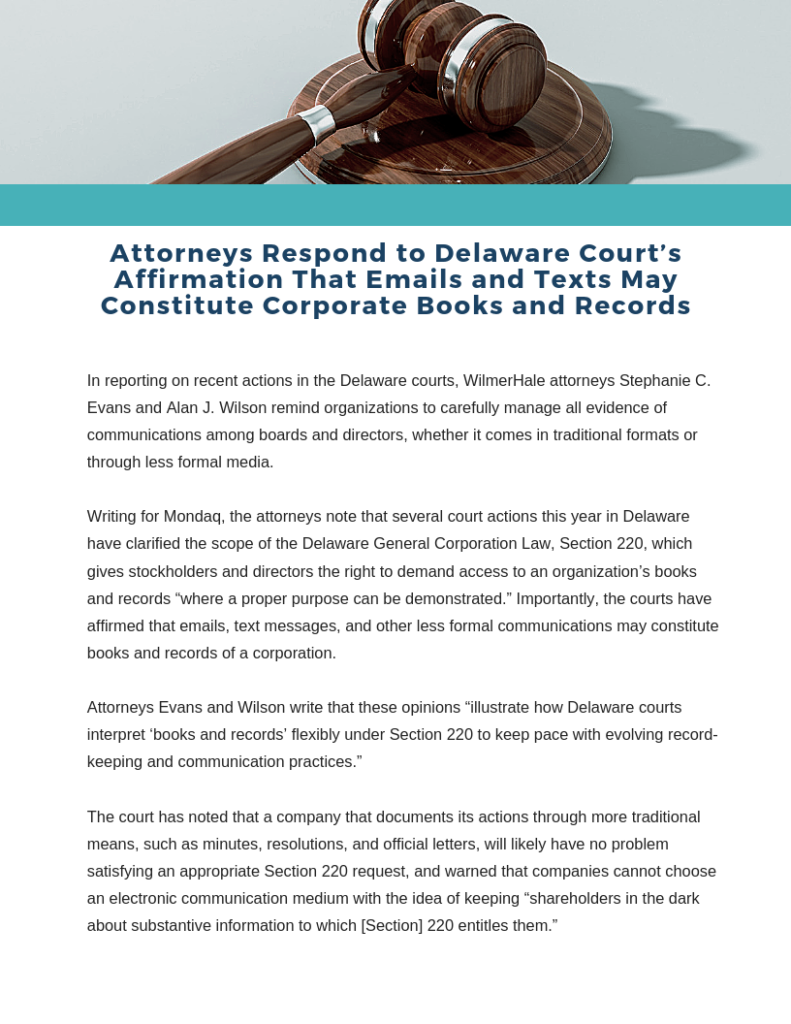Attorneys Respond to Delaware Court’s Affirmation That Emails and Texts May Constitute Corporate Books and Records

In reporting on recent actions in the Delaware courts, WilmerHale attorneys Stephanie C. Evans and Alan J. Wilson remind organizations to carefully manage all evidence of communications among boards and directors, whether it comes in traditional formats or through less formal media.
Writing for Mondaq, the attorneys note that several court actions this year in Delaware have clarified the scope of the Delaware General Corporation Law, Section 220, which gives stockholders and directors the right to demand access to an organization’s books and records “where a proper purpose can be demonstrated.” Importantly, the courts have affirmed that emails, text messages, and other less formal communications may constitute books and records of a corporation.
Attorneys Evans and Wilson write that these opinions “illustrate how Delaware courts interpret ‘books and records’ flexibly under Section 220 to keep pace with evolving record-keeping and communication practices.”
The court has noted that a company that documents its actions through more traditional means, such as minutes, resolutions, and official letters, will likely have no problem satisfying an appropriate Section 220 request, and warned that companies cannot choose an electronic communication medium with the idea of keeping “shareholders in the dark about substantive information to which [Section] 220 entitles them.”
Additionally, the Delaware courts have signaled they may in certain instances – on a case-by-case basis – request to review the devices that hold such “personal” communications.
Evans and Wilson of WilmerHale advise directors, corporate secretaries, and company counsel to “be mindful of good corporate housekeeping practices involving the maintenance of corporate books and records.”
Further, they advise such entities to always keep documentation of board actions in formal meeting minutes and written consents; to make sure these formal records are “sufficiently robust” so that directors or stockholders don’t feel the need to seek less formal communications; and to educate everyone about the risks of using less-formal communications and personal accounts or devices when discussing business.

View the PDF version of this article
[ls_content_block id=”957″]
[ls_content_block id=”734″]
About the Author
 Communications2019.09.17Eisen’s Book on Rule-Writing Delivers on its ‘How-To’ Promises
Communications2019.09.17Eisen’s Book on Rule-Writing Delivers on its ‘How-To’ Promises Analytics2019.09.06Will Google Play Fair in the ‘Privacy Sandbox?’
Analytics2019.09.06Will Google Play Fair in the ‘Privacy Sandbox?’ Electronic Records Management2019.06.18Goals of New Canadian Digital Charter Include Assuring Privacy, Eradicating Hate Online
Electronic Records Management2019.06.18Goals of New Canadian Digital Charter Include Assuring Privacy, Eradicating Hate Online Analytics2019.06.11Why Are Businesses Opting for Edge, AI, and IoT – and Are They Wise to Do So?
Analytics2019.06.11Why Are Businesses Opting for Edge, AI, and IoT – and Are They Wise to Do So?